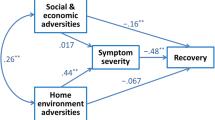Abstract
Research on the role of social support in recovery from severe mental illness is limited and even more limited is research on the potential effects of participating in various activities. This study explores these relationships by analyzing baseline data from a 153-participant subsample in the Study of Transitions and Recovery Strategies. Higher scores on the recovery assessment scale were related to both social support/network size and engagement in more activities. The particular nature of the activities (more/less social, more/less physically active, inside/outside the home) was not important, rather, activities of any type were related to recovery. Furthermore, engagement in activities was more important as levels of social support declined. The results suggest that both social support and activities may promote recovery, and that for persons with poor social support, engagement in a variety of individualized activities may be particularly beneficial.

Similar content being viewed by others
References
White W, Boyle M, Loveland D. Recovery from addiction and from mental illness: shared and contrasting lessons. In: Ralph RO, Corrigan PW, eds. Recovery in Mental Illness: Broadening our Understanding of Wellness. Washington, DC: American Psychological Association; 2004.
Mezzina R, Davidson L, Borg M, et al. The social nature of recovery: Discussion and implications for practice. American Journal of Psychiatric Rehabilitation. 2006;9:63–80. doi:10.1080/15487760500339436.
Stansfeld SA. Social support and social cohesion. In: Marmot M, Wilkinson RG, eds. Social Determinants of Health, Second Edition. Oxford: Oxford University Press; 2006:148–171.
Breier A, Strauss JS. The role of social relationships in the recovery from psychotic disorders. American Journal of Psychiatry. 1984;141:949–955.
Onken SJ, Craig CM, Ridgway P, et al. An analysis of the definitions and elements of recovery: a review of the literature. Psychiatric Rehabilitation Journal. 2007;31:9–22. doi:10.2975/31.1.2007.9.22.
Corrigan PW, Giffort D, Rashid F, et al. Recovery as a psychological construct. Community Mental Health Journal. 1999;35:231–239. doi:10.1023/A:1018741302682.
Corrigan PW, Phelan SM. Social support and recovery in people with serious mental illnesses. Community Mental Health Journal. 2004;40:513–523. doi:10.1007/s10597-004-6125-5.
Pevalin DJ, Goldberg DP. Social precursors to onset and recovery from episodes of common mental illness. Psychological Medicine. 2003;33:299–306. doi:10.1017/S0033291702006864.
Kendler KS, Walters EE, Kessler RC. The prediction of length of major depressive episodes: results from an epidemiological sample of female twins. Psychological Medicine. 1997;27:107–117. doi:10.1017/S0033291796003893.
Lara ME, Leader J, Klein DN. The association between social support and course of depression: is it confounded with personality? Journal of Abnormal Psychology. 1997;106:478–482. doi:10.1037/0021-843X.106.3.478.
Johnson SL, Winett CA, Meyer B, et al. Social support and the course of bipolar disorder. Journal of Abnormal Psychology. 1999;108:555–557. doi:10.1037/0021-843X.108.4.555.
Mancini MA, Hardiman ER, Lawson HA. Making sense of it all: consumer providers’ theories about factors facilitating and impeding recovery from psychiatric disabilities. Psychiatric Rehabilitation Journal. 2005;29:48–55. doi:10.2975/29.2005.48.55.
Morrow-Howell N, Hinterlong J, Rozario PA. Effects of volunteering on the well-being of older adults. Journal of Gerontology: Social Sciences. 2003;58B:S137–S145.
Musick MA, Wilson J. Volunteering and depression: the role of psychological and social resources in different age groups. Social Science and Medicine. 2003;56:259–269. doi:10.1016/S0277-9536(02)00025-4.
Ware JE, Kosinski M, Turner-Bowker DM. How to Score Version 2 of the SF-12 Health Survey (with a supplement documenting Version 1). Lincoln, RI: QualityMetric Incorporated; 2002.
Ware JE, Kosinski M, Keller SD. SF-12: How to Score the SF-12 Physical and Mental Health Summary Scales. Boston: The Health Institute, New England Medical Center; 1995.
Tunis SL, Croghan TW, Heilman DK. Reliability, validity, and apllication of the medical outcomes study 36-item short-form health survey (SGF-36) in schizophrenic patients treated with olanzapine versus haloperidol. Medical Care. 1999;37:678–691. doi:10.1097/00005650-199907000-00008.
Becker M. A new patient focused index for measuring quality of life in persons with severe and persistent mental illness. Quality of Life Research. 1993;2:239–251. doi:10.1007/BF00434796.
Becker M. Qualiy-of-life instruments for severe chronic mental illness. Implications for pharmacotherapy. Pharmacoeconomics. 1995;7:229–237. doi:10.2165/00019053-199507030-00006.
Becker M. A US experience: consumer responsive quality of life measurement. Canadian Journal of Community Mental Health. 1998;3(Suppl):41–58.
Crespo-Facorro B, Pelavo-Teran JM, Perez-Iglesias R, et al. Predictors of acute treatment response in patients with a first episode of non-affective psychosis: sociodemographics, premorbid and clinical variables. Journal of Psychiatric Research. 2007;41:659–666. doi:10.1016/j.jpsychires.2006.05.002.
Leverich GS, Post RM, Keck PE, et al. The poor prognosis of childhood-onset bipolar disorder. Journal of Pediatrics. 2007;150:485–490. doi:10.1016/j.jpeds.2006.10.070.
McEvoy JP, Lieberman JA, Perkins DO, et al. Efficacy and tolerability of olanzapine, quetiapine, and respiridone in the treatment of early psychosis: a randomized, double-blind 52-week comparison. American Journal of Psychiatry. 2007;164:1050–1060. doi:10.1176/appi.ajp.164.7.1050.
Strous RD, Alvir JM, Robinson D, et al. Premorbid functioning in schizophrenia: relation to baseline symptoms, treatment response, and medication side effects. Schizophrenia Bulletin. 2004;30:265–278.
Beebe LH, Tian L, Morris N, et al. Effects of exercise on mental and physical health parameters of persons with schizophrenia. Issues in Mental Health Nursing. 2005;26:661–676. doi:10.1080/01612840590959551.
Acknowledgements
This research was supported by a grant from the National Institute of Mental Health (Recoveries from Severe Mental Illness, R01 MH062321). The authors would like to thank interviewers Sue Leung, Alison Firemark, David Castleton, and Micah Yarborough. We also thank analysts Elizabeth Shuster and Michael Leo, who helped prepare the data used in these analyses. In addition, we thank Hannah Cross and Robert Paulson for providing helpful contributions to earlier drafts.
Author information
Authors and Affiliations
Corresponding author
Rights and permissions
About this article
Cite this article
Hendryx, M., Green, C.A. & Perrin, N.A. Social Support, Activities, and Recovery from Serious Mental Illness: STARS Study Findings. J Behav Health Serv Res 36, 320–329 (2009). https://doi.org/10.1007/s11414-008-9151-1
Received:
Accepted:
Published:
Issue Date:
DOI: https://doi.org/10.1007/s11414-008-9151-1




